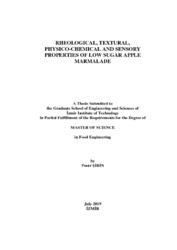Please use this identifier to cite or link to this item:
https://hdl.handle.net/11147/7352| Title: | Rheological, Textural, Physico-Chemical and Sensory Properties of Low Sugar Apple Marmalade | Other Titles: | Düşük Şekerli Elma Marmelatının Reolojik, Dokusal, Fizikokimyasal ve Duyusal Özellikleri | Authors: | Şirin, Pınar | Advisors: | Ünlütürk, Sevcan | Keywords: | Apple marmalade Total soluble solids Sweeteners |
Publisher: | Izmir Institute of Technology | Source: | Şirin, P. (2019). Rheological, textural, physico-chemical and sensory properties of low sugar apple marmalade. Unpublished master's thesis, İzmir Institute of Technology, İzmir, Turkey | Abstract: | Homemade low-sugar apple marmalade formulations were developed by partial
replacement of sucrose with sweeteners such as stevioside and sucralose (25%, 50%)
without using commercial pectin and chemical preservative additives. The objectives of
this study were to formulate and optimize the composition of ingredients for the best
quality low sugar marmalade production, to determine the rheological, textural and
physicochemical properties and overall acceptability of formulated marmalades.
The concentration of sweeteners was found to have a significant effect on the
physicochemical and rheological properties of the formulations. The hardness of the
sweetener added marmalades decreased due to the reduction of total soluble solids (TSS).
The marmalade samples had pseudo-plastic behavior exhibiting yield stress. Yield stress
of the marmalade increased with increasing TSS content upon increasing sweeteners
concentration. Herschel–Bulkley model was found to be the best model describing the
time-independent rheological behavior of formulated marmalade samples. The
consistency index decreased with raising the sweeteners substitution, whereas the flow
behavior index showed increasing trend with the increase of the sweeteners content. From
the sensory point of view, low sugar marmalades made by substituting 50% of the sugar
content with stevioside have been shown to be as acceptable as marmalade containing
only 500g of sucrose. Ev yapımı düşük şekerli elma marmelatı formülasyonları, ticari pektin ve kimyasal koruyucu katkı maddeleri kullanılmadan, sukrozun stevia ve sukraloz gibi alternatif tatlandırıcılar (%25, %50) ile kısmen değiştirilmesiyle geliştirilmiştir. Bu çalışmanın amaçları, en iyi kalitede düşük şeker marmelat üretimi için içerik bileşimini optimize ve formüle etmek ve formüle edilmiş marmelatların reolojik, dokusal ve fizikokimyasal özelliklerini ve genel olarak kabul edilebilirliğini belirlemektir. Tatlandırıcı konsantrasyonunun, formülasyonların fizikokimyasal ve reolojik özellikleri üzerinde önemli bir etkiye sahip olduğu bulunmuştur. Tatlandırıcı eklenmiş marmelatların sertliği, toplam çözünür katı maddelerin azalması nedeniyle azalmıştır. Marmelat numuneleri verim stresi sergileyen psödoplastik davranış göstermiştir. Tatlandırıcı konsantrasyonunun artması üzerine marmelatın verim stresi, artan TSS içeriği ile artmıştır. Herschel-Bulkley modelinin formüle edilmiş marmelat örneklerinin zamandan bağımsız reolojik davranışını tanımlayan en iyi model olduğu belirlenmiştir. Kıvam indeksi, tatlandırıcı ikamelerinin arttırılmasıyla azalırken, akış davranış endeksi tatlandırıcı içeriğinin artmasıyla birlikte artan bir eğilim göstermiştir. Duyusal açıdan bakıldığında, şeker içeriğinin %50'sinin stevia ile ikame edilmesiyle yapılan düşük şeker marmelatlarının, sadece 500 g sukroz içeren marmelat kadar kabul edilebilir olduğu gösterilmiştir. |
Description: | Thesis (Master)--Izmir Institute of Technology, Food Engineering, Izmir, 2019 Includes bibliographical references (leaves: 100-115) Text in English; Abstract: Turkish and English |
URI: | https://hdl.handle.net/11147/7352 |
| Appears in Collections: | Master Degree / Yüksek Lisans Tezleri |
Files in This Item:
| File | Description | Size | Format | |
|---|---|---|---|---|
| T002026.pdf | MasterThesis | 1.91 MB | Adobe PDF |  View/Open |
CORE Recommender
Page view(s)
448
checked on Jun 16, 2025
Download(s)
2,118
checked on Jun 16, 2025
Google ScholarTM
Check
Items in GCRIS Repository are protected by copyright, with all rights reserved, unless otherwise indicated.